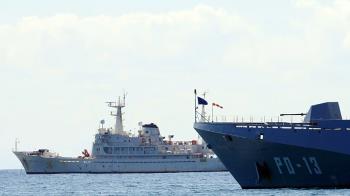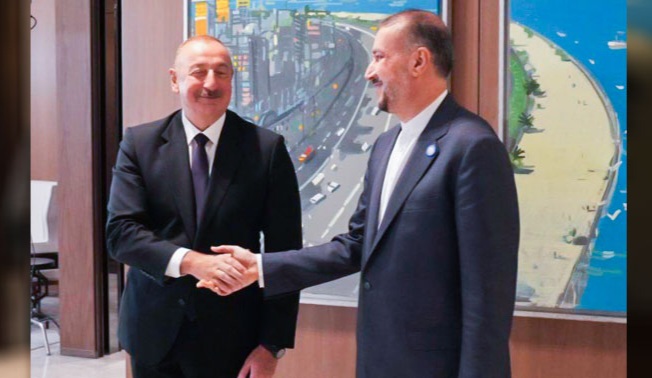Alwaght- The offensive guard Azerbaijan has taken against Iran in the past months seems to have eased in the face of the Iranian diplomatic moves recently, reviving hopes about resuming past relations.
Iran's Foreign Minister Hussein Amir-Abdollahian last week and on the sidelines of Non-Aligned Movement summit in Baku met and discussed with senior Azerbaijani officials. In his two-hour meeting with President Ilham Aliyev, Amir-Abdollahian discussed important bilateral and regional issues.
The top diplomat described the talks as “positive”, adding that the friendly discussion is expected to open a new chapter in the two neighbors’ relationship and “frustrate the enemies and evil wishers.”
The attack on the Azerbaijani embassy in Tehran and agreement on reopening embassies in the near future were top cases the officials of two countries discussed.
But the main point of this meeting was the issue of regional security, in which Baku authorities showed a softer tone. In the meeting, Aliyev pointed to the importance of the relations between the two neighboring and Muslim countries and stressed on the importance of the relations between them, especially in the economic sectors, including transportation and routes.
Insisting that he will never allow any threat to Iran and the region from Azerbaijan’s soil, Aliyev held that Baku seeks to unblock the linking regional routes and is “committed to Iran's historical routes in the region.”
Aliyev's softened position comes while before this, Baku authorities had sought to change the geopolitics of the Caucasus by building Zangezor corridor, a route that would cut off the borders of Iran and Armenia forever. It seems that the regional and global developments have led them to the conclusion that the contentious policies in the region do not work and they should choose a path of peace and stability.
Factors softening Baku’s tone
In recent years, what caused Azerbaijan to take uncalculated stances in Karabakh was the all-out support of Turkey that encouraged it to advance its agenda.
Earlier, Turkey has unilaterally been defending Azerbaijan's positions against Armenia, but recently and mainly after presidential elections, Ankara officials have reviewed their policy and are taking steps towards de-escalation with Armenia.
Over the past year, Turkish President Recep Tayyip Erdogan held talks with senior Yerevan officials to restore past relations after three decades of tensions. Last week, Erdogan and the Prime Minister of Armenia Nikol Pashinyan discussed fully restoring diplomatic relations and reopening the land border between the two countries. This issue is important because in case of the normalization of relations between Ankara and Yerevan, Erdogan's government will have to distance itself from the contentious expectations of Baku regarding the developments in Karabakh and take into consideration the interests of Armenia, which is in conflict with Baku's wishes. In other words, getting closer to Armenia means pushing Azerbaijan to choose diplomatic channels rather than military solutions.
Erdogan, who is in his last presidential term, is pushing to improve Turkey's relations with the whole world and sees tensions in Karabakh of no avail. The ‘Turkic world’ initiative that he is seeking to realize will come to reality only when peace and stability prevail in the region and the continuation of the controversial policy with Armenia, a country connecting Turkey to other parts of this controversial initiative, will block any peace advances. On the other hand, due to the shaky results of the recent presidential elections, Erdogan knows that there is not much opportunity to realize his plans in the region, so, he is trying to continue the path of friendship with his neighbors.
Erdogan was a backer of the controversial Zangezor corridor, but now he seems no longer supports it, and recently he in a speech held that the main obstacle to this corridor was Iran. Turkey has come to believe that Iran will not walk back from its opposition to this corridor, and therefore Ankara has changed its approach and threw the ball in Baku's court to resolve its differences with Tehran, because Erdogan's contentious policies in the region have not benefited Ankara so far and in the new government, he follows the policy of regional convergence. Therefore, Aliyev has come to conclusion that, with Turkey's position concerning Karabakh developments shifting, he can no longer count on the support of Erdogan to advance his plans.
Iranian principal positions yielded results
Another issue pushing Baku back from its ambitious policies is the firm and principal position of the Islamic Republic of Iran that opposed any plans to change the borders and regional geopolitical features. Holding military exercises by the Iranian armed forces near the borders of Azerbaijan was a warning to Baku that Tehran will not allow changes to historical status of the geopolitical borders of the region because it will disrupt stability. Baku faced Tehran's warnings while it was already aware that it is impossible to implement its plans to change the geography of the Caucasus.
Despite the fact that Iranian officials have always asserted that Karabakh is a part of Azerbaijan's territory that should be returned to the mainland, they also consider Iran's national interests, and cutting off land borders of Iran and Armenia is something Tehran cannot tolerate.
After escalation with Iran, Aliyev moved to deeper ties with Israel, an archenemy of Iran, to utilize the Israeli power to put strains on its southern neighbor. But this trick met its failure.
The fact that Aliyev says he will not allow any military action against Iran from his territory is a step forward in show of commitment to Iran's legitimate security concerns, but Baku should feel the principal reality that divisive policies of the Israelis will bring about nothing but instability and Azerbaijan will be top to take harms from consequences of cooperation with the Israelis.
Another issue that affects Baku's policy in Karabakh and causes review to its contentious tendencies in the region is the positions of trans-regional powers that almost supported Armenia in Karabakh. India is one of the emerging powers that is trying to expand its influence in the strategic regions of the world and has played an important role in the tense Karabakh region in recent years.
New Delhi is one of the main arms suppliers of Yerevan, having already signed major deals with it. Recently, Euroreporter news outlet reported that India is to deliver self-propelled MArG 155/ 39 howitzers to Armenia with French support. Produced in India, these howitzers are a replica of French CAESAR systems. Delivery of these weapons to Armenia can upscale Yerevan’s military stance against Azerbaijan and create a balance.
Thanks to its relative military strength, Azerbaijan managed to take back Karabakh from Armenia, but if the leaders of Baku come to the conclusion that Armenia can reach a military equilibrium, they will stop their adventures. Therefore, the action of France and India shows that the big powers follow the policy of supporting Armenia in order not to allow Azerbaijan to pursue its controversial policies.
After the start of the Ukraine crisis, which led to closure of Russia's borders with Europe, India looked for alternative routes to transfer its goods to the European markets, and recently, with the participation of Iran and Armenia, New Delhi put the Persian Gulf to the Black Sea corridor on its agenda. The new corridor will connect Armenia to Europe and therefore the security of the borders of Armenia grow important for the Indians. By their support to Yerevan, the Indian officials send a message to Baku that they will not allow Azerbaijan's Zangezor corridor plan to kill their trade route.
Though a member of Minsk Group, a platform seeking peace between Azerbaijan and Armenia, France roughly leans to support to Armenia’s positions against Azerbaijan. In recent month, Western countries sent their military personnel under security experts title to Armenian borders to check Azerbaijani ambitions. The EU as a guarantor of Minsk agreement, deems any modification of borders a threat to its interests.
Over the past three years, Baku officials have had a unilateral picture of the terms of Karabakh peace deal of 2020 and have acted in accordance with their interpretations when it comes to Lachin Corridor construction. However, shifting regional and global developments have forced Baku to give its stated policies a second thought.
Though recent Aliyev’s remarks cannot mean a full retreat from previous stances, they indicate that Baku intends to engage in cooperation with Tehran to, at least, conclude Lachin Corridor project in line with its demands and interests. This is driven by the conclusion of Azerbaijan leaders that international circumstances do not allow Zangezor corridor construction and they have to settle for the minimum to realize part of their interests.



























